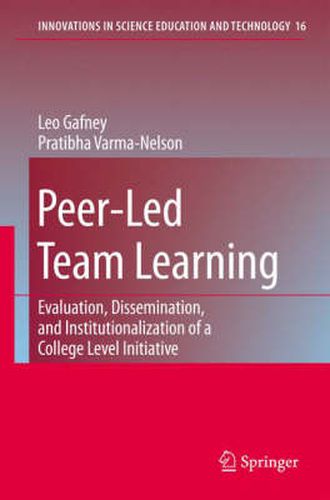Readings Newsletter
Become a Readings Member to make your shopping experience even easier.
Sign in or sign up for free!
You’re not far away from qualifying for FREE standard shipping within Australia
You’ve qualified for FREE standard shipping within Australia
The cart is loading…






This title is printed to order. This book may have been self-published. If so, we cannot guarantee the quality of the content. In the main most books will have gone through the editing process however some may not. We therefore suggest that you be aware of this before ordering this book. If in doubt check either the author or publisher’s details as we are unable to accept any returns unless they are faulty. Please contact us if you have any questions.
There seems to be no end to the flood of conferences, workshops, panel discussions, reports and research studies calling for change in the introductory science courses in our colleges and universities. But, there comes a time to move from criticism to action. In 1993, the Division of Undergraduate Education of the National Science Foundation called for proposals for systemic initiatives to change the way int- ductory chemistry is taught. One of the five awards was to design, develop and implement the peer-led Workshop, a new structure to help students learn science. This book is a study of 15 years of work by the Peer-Led Team Learning (PLTL) project, a national consortium of faculty, learning specialists and students. The authors have been in the thick of the action as project evaluator (Gafney) and co-principle investigator (Varma-Nelson). Readers of this book will find a story of successful change in educational practice, a story that continues today as new institutions, faculty, and disciplines adopt the PLTL model. They will learn the model in theory and in practice and the supporting data that encourage others to adopt and adapt PLTL to new sit- tions. Although the project has long since lost count of the number of implem- tations of the model, conservative estimates are that more than 100 community and four year colleges and a range of universities have adopted the PLTL model to advance student learning for more than 20,000 students in a variety of STEM disciplines.
$9.00 standard shipping within Australia
FREE standard shipping within Australia for orders over $100.00
Express & International shipping calculated at checkout
This title is printed to order. This book may have been self-published. If so, we cannot guarantee the quality of the content. In the main most books will have gone through the editing process however some may not. We therefore suggest that you be aware of this before ordering this book. If in doubt check either the author or publisher’s details as we are unable to accept any returns unless they are faulty. Please contact us if you have any questions.
There seems to be no end to the flood of conferences, workshops, panel discussions, reports and research studies calling for change in the introductory science courses in our colleges and universities. But, there comes a time to move from criticism to action. In 1993, the Division of Undergraduate Education of the National Science Foundation called for proposals for systemic initiatives to change the way int- ductory chemistry is taught. One of the five awards was to design, develop and implement the peer-led Workshop, a new structure to help students learn science. This book is a study of 15 years of work by the Peer-Led Team Learning (PLTL) project, a national consortium of faculty, learning specialists and students. The authors have been in the thick of the action as project evaluator (Gafney) and co-principle investigator (Varma-Nelson). Readers of this book will find a story of successful change in educational practice, a story that continues today as new institutions, faculty, and disciplines adopt the PLTL model. They will learn the model in theory and in practice and the supporting data that encourage others to adopt and adapt PLTL to new sit- tions. Although the project has long since lost count of the number of implem- tations of the model, conservative estimates are that more than 100 community and four year colleges and a range of universities have adopted the PLTL model to advance student learning for more than 20,000 students in a variety of STEM disciplines.